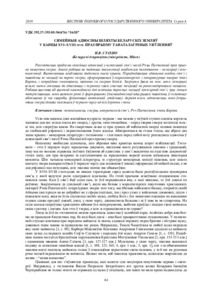Please use this identifier to cite or link to this item:
https://elib.psu.by/handle/123456789/22694| Title: | Сямейныя адносіны шляхты беларускіх земляў у канцы XVI–XVIII стст. праз прызму танаталагічных уяўленняў |
| Authors: | Стахно, Н. В. |
| Issue Date: | 2018 |
| Publisher: | Полоцкий государственный университет |
| Citation: | Вестник Полоцкого государственного университета. Серия A, Гуманитарные науки. - 2018. - № 9 – C. 64 |
| Abstract: | Разглядаецца праблема сямейных адносінаў у шляхецкай сям’і часоў Рэчы Паспалітай праз прызму канцэпта смерці. Аналіз робіцца на падставе дакументаў асабістага паходжання – мемуараў і тэстаментаў. Вызначаюцца асаблівасці дадзенага тыпу крыніц. Параўноўваецца ідэальная мадэль сям’і і паводзіны яе чальцоў на парозе смерці, сфарміраваныя ў маралізатарскіх і літаратурных творах эпохі Барока, і сапраўднае становішча, звязанае са смерцю блізкіх. Звернута ўвага на тое, што гісторыкі вельмі часта імкнуцца да ідэалізацыі і пераносу сваіх уласных пачуццяў на раннемадэрновага чалавека. Робіцца выснова аб высокай каштоўнасці для шляхціца дарослых чальцоў нуклеарнай сям’і, пры гэтым падкрэсліваецца, што важную ролю ў фарміраванні ўзаемаадносінаў адыгрывалі паводзіны ў складаных абставінах (у час хваробы, фінансавых цяжкасцяў, удоўства). Акрамя таго, адзначаецца, што ўспрыняцце смерці дзіцяці залежыла ў першую чаргу ад яго ўзроста і пола.= The article is devoted to the problem of a noble’s family relations in times of the Polish-Lithuanian Commonwealth through the prism of deaths’ concept. The analysis is performed on the basis of documents of a personal origin – memoirs and testaments. Defines the features of this type of sources. The author compares the ideal family model and the behavior of its members at death's door formed in the Baroque’s moralistic and liter-ary works and the real state associated with the death of loved ones. Attention is drawn to the fact that historians often tend to idealize and transfer their own feelings on person of Modern times. It is concluded that high value has adult members of the nuclear family, while emphasizing that the key role in the formation of the relationship played behavior in difficult circumstances (during illness, financial difficulties, widowhood). Moreover, it is not-ed that the perception of the child's death depended primarily on his or her age and sex. |
| Keywords: | Государственный рубрикатор НТИ - ВИНИТИ::ОБЩЕСТВЕННЫЕ НАУКИ::История. Исторические науки Ментальнасць Смерць Антрапалогія сям’і Рэч Паспалітая Эпоха Барока Mentality Death Family anthropology Polish-Lithuanian Commonwealth Baroque |
| URI: | https://elib.psu.by/handle/123456789/22694 |
| metadata.dc.rights: | open access |
| Appears in Collections: | 2018, № 9 |
Items in DSpace are protected by copyright, with all rights reserved, unless otherwise indicated.
